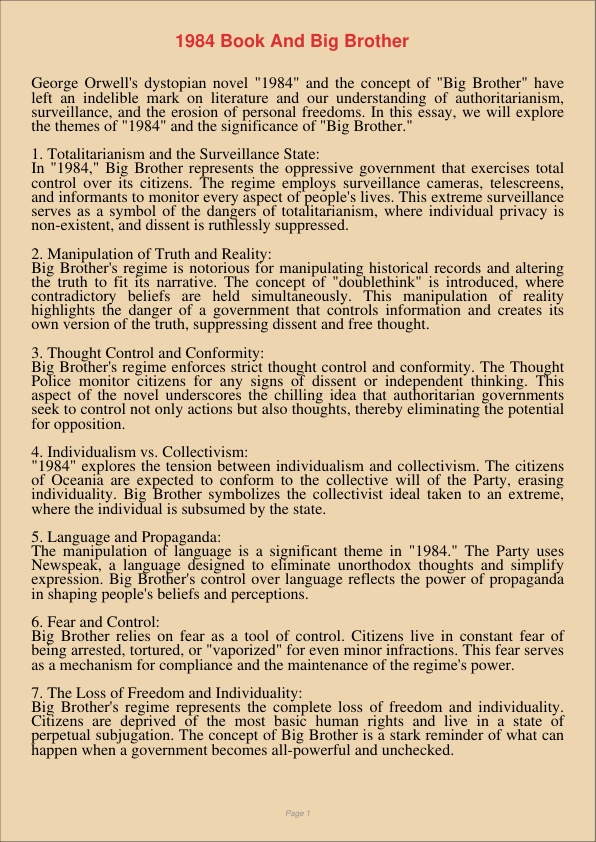1984 Book And Big Brother
Jan 9, 2024
big brother
1984 book
Religion and Theology
Law
George Orwell’s dystopian novel “1984” and the concept of “Big Brother” have left an indelible mark on literature and our understanding of authoritarianism, surveillance, and the erosion of personal freedoms. In this essay, we will explore the themes of “1984” and the significance of “Big Brother.”
-
Totalitarianism and the Surveillance State: In “1984,” Big Brother represents the oppressive government that exercises total control over its citizens. The regime employs surveillance cameras, telescreens, and informants to monitor every aspect of people’s lives. This extreme surveillance serves as a symbol of the dangers of totalitarianism, where individual privacy is non-existent, and dissent is ruthlessly suppressed.
-
Manipulation of Truth and Reality: Big Brother’s regime is notorious for manipulating historical records and altering the truth to fit its narrative. The concept of “doublethink” is introduced, where contradictory beliefs are held simultaneously. This manipulation of reality highlights the danger of a government that controls information and creates its own version of the truth, suppressing dissent and free thought.
-
Thought Control and Conformity: Big Brother’s regime enforces strict thought control and conformity. The Thought Police monitor citizens for any signs of dissent or independent thinking. This aspect of the novel underscores the chilling idea that authoritarian governments seek to control not only actions but also thoughts, thereby eliminating the potential for opposition.
-
Individualism vs. Collectivism: “1984” explores the tension between individualism and collectivism. The citizens of Oceania are expected to conform to the collective will of the Party, erasing individuality. Big Brother symbolizes the collectivist ideal taken to an extreme, where the individual is subsumed by the state.
-
Language and Propaganda: The manipulation of language is a significant theme in “1984.” The Party uses Newspeak, a language designed to eliminate unorthodox thoughts and simplify expression. Big Brother’s control over language reflects the power of propaganda in shaping people’s beliefs and perceptions.
-
Fear and Control: Big Brother relies on fear as a tool of control. Citizens live in constant fear of being arrested, tortured, or “vaporized” for even minor infractions. This fear serves as a mechanism for compliance and the maintenance of the regime’s power.
-
The Loss of Freedom and Individuality: Big Brother’s regime represents the complete loss of freedom and individuality. Citizens are deprived of the most basic human rights and live in a state of perpetual subjugation. The concept of Big Brother is a stark reminder of what can happen when a government becomes all-powerful and unchecked.
-
Resistance and Hope: Despite the bleak and oppressive world portrayed in “1984,” the novel also explores the possibility of resistance and the innate human desire for freedom. Characters like Winston and Julia symbolize the human spirit’s resilience and the yearning for a better future, even in the face of overwhelming adversity.
In conclusion, “1984” and the concept of Big Brother serve as cautionary tales about the dangers of totalitarianism, surveillance, manipulation of truth, and the erosion of personal freedoms. It remains a powerful reminder of the importance of safeguarding individual liberties, protecting the truth, and resisting authoritarianism in all its forms. The novel’s enduring relevance makes it a thought-provoking and chilling exploration of the consequences of unchecked government power.
